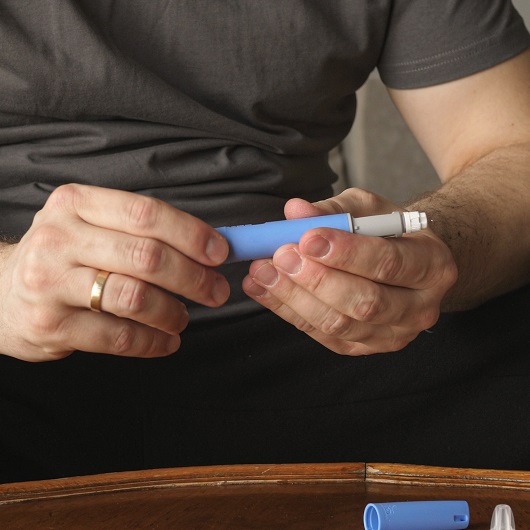Life After Ozempic The Decision to Stop and What Comes Next

October 24, 2024
Updated March 18. 2025
The list of programs, diets and methods of weight loss is endless. The latest trend is injectable medications.
The results can be remarkable, but weight loss drugs like Ozempic might not be something you want to take forever. Our weight loss expert explains what to expect when you stop taking Ozempic and how to maintain your new healthy weight.
What Is Ozempic and How Does It Work?
“Ozempic is an injectable medication that was originally approved for use by those with diabetes,” says Hans Schmidt, M.D., director of the Center for Weight Loss and Metabolic Health at Hackensack University Medical Center. A positive side effect of the medication is weight loss.
Ozempic mimics a gastrointestinal hormone called GLP-1, which helps to reduce hunger and cravings. It also regulates insulin response.
What Happens When You Stop Ozempic?
Ozempic is injected once a week. So about a week after stopping the medicine, you will start to notice that your hunger and cravings may return. You may not feel as full for as long.
While Ozempic doesn’t usually have withdrawal symptoms, people with type 2 diabetes may experience high blood sugar levels. This may lead to symptoms like:
- Excessive thirst and urination
- Fatigue
- Headaches
- Blurry vision
Due to the return of hunger and cravings, you may experience what has been called “Ozempic rebound.” This is when you start to regain the weight you lost.
According to one study published in Diabetes, Obesity and Metabolism, stopping Ozempic or other weight loss drugs led to most of the weight being regained within one year. Studies like these show that obesity is a chronic disease that may need continued treatment.
But this rebound effect is not unique to Ozempic. It can happen with any weight loss tool you suddenly stop using.
Why Would You Stop Ozempic?
Ozempic has positive and proven results, so why would someone stop using it? Dr. Schmidt says there are generally three reasons you may need to stop using Ozempic:
- Side effects. “About 15 percent of people have significant side effects,” says Dr. Schmidt. These generally include nausea, constipation or abdominal pain.
- Shortage. Ozempic is popular. The manufacturer cannot meet demand, so some pharmacies are running out and unable to fill prescriptions for it.
- Achieved weight goal. “Once you’ve achieved your weight goal, you may no longer need the medication,” says Dr. Schmidt.
For those only taking Ozempic for weight loss, once you reach your goal weight, your insurance may no longer cover it. At about $1,000 per month, it’s not an affordable option for most people without the help of insurance.
How to Maintain Post-Ozempic Weight
Just because you stop Ozempic doesn’t mean you will gain the weight back. “As with any weight loss program, sustained weight loss will only happen with a lifestyle change in diet habits and exercise,” says Dr. Schmidt.
While Ozempic may feel like magic, you need to put the work and effort in while you’re on it, so when you stop, you can maintain a healthy weight. Dr. Schmidt suggests preparing with healthy foods and anticipating that you will feel more hunger and cravings.
Is Bariatric Surgery Better Than Ozempic?
While there is no clear line between who should try medication and who should opt for weight loss surgery, generally, Dr. Schmidt says, “Surgery is probably the best option if you need to lose more than 100 pounds.”
While surgery also requires modification in lifestyle, permanent changes to your anatomy lowers the chance of weight regain for most patients.
Ozempic is a great tool, but it’s just a tool. If you think it might help, be sure to get it from a trusted, legal source. Ozempic’s popularity and high cost has led to alternative sources making unregulated copies of it.
Dr. Schmidt warns, “You don’t know what is in those generic products, so be sure to get the authentic medication from a reputable center that can provide you with a complete evaluation and comprehensive weight loss plan.”
Next Steps & Resources:
- Meet our source: Hans J. Schmidt, M.D.
- Make an appointment with a bariatric specialist or call 800-822-8905
- Learn more about weight management services at Hackensack Meridian Health.
- Thinking about weight loss surgery? Take our weight-loss surgery survey.
The material provided through HealthU is intended to be used as general information only and should not replace the advice of your physician. Always consult your physician for individual care.








